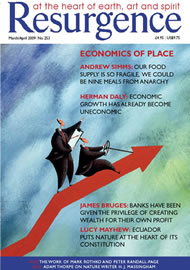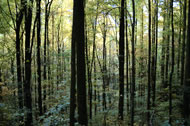I WAS FIRST introduced to the work of Father Thomas Berry more than twenty-five years ago – when I was handed copies of his unpublished essays The Ecological Age, and The New Story by his brother James Berry, who was the head of an alliance of educators and activists that went by the name of The Center for Reflection of the 2nd Law – an inquisitive and spiritually-grounded group based on the thoughts and teachings of Thomas Berry and Teilhard de Chardin.
I had been asked to address a meeting of the 2nd Law group, there at the Berry family home, and to talk on the work of Gary Snyder and Wendell Berry, both of whom I had come to know during my years in northern California. After my presentation, I went back to my cabin in the woods of Polk County, North Carolina, where I was living Thoreau-like, and read the essays. I was very excited by Thomas Berry’s ideas pertaining to communion and intercommunion and differentiation and diversity.
I immediately wrote a poem entitled Song of Devotion –which was essentially the re-visioning of the 23rd Psalm in the Bible, giving the biblical scripture a new focus: on the Earth and the environment, rather than on Christian doctrine and dogmatic religious symbology. Later, Father Berry would inspire me to formulate an environmental politic that hinged, precariously, on the statement: “I am not willing to live in a world absent of elephants and whales.”
All my life, up until then, I had been looking for a teacher. In Thomas Berry, I found not only a teacher, but a mentor, a model. Since that first encounter, I have had the good fortune to come to know him, to publicly share the stage with him in my capacity as poet, and to share in the vision of his work by reviewing it and introducing it to others through my own writing. But best of all – to come to know him as a friend.
AS HE APPROACHES ninety-five years of age, Thomas Berry has created a remarkable legacy – as a thinker, philosopher and scholar, an author, and finally as an elder, alter-ego and cultural conscience for the entire human race. A cross between Saint Thomas Aquinas and Saint Francis of Assisi, he is the first ‘Ecologian’ – a dovetailing of ecologist and theologian. As a path-maker and maybe the closest thing we have to a saint in America, his ideas exist on the cutting edge of the future.
At the core of Father Berry’s most seminal books (The Dream of the Earth, The Universe Story, and The Great Work) are epiphanal lines such as “It’s all a question of story.” “At each moment we must simply be what we are and open to a larger life.” “To harm the Earth is to harm man, to ruin the Earth is to destroy man.” In his apocalyptic writings he advocates a revelatory epiphany in the collective human psyche – that lifts us to a higher plateau of consciousness and spiritual awareness; a system that teaches the “Universe Story,” as he calls it, as the very foundation of religious and secular education; and harmony, balance and respect as a spiritual practice – by all peoples and cultures.
Thomas Berry’s work is essential to our times and this crucial, pivotal moment in human and planetary history. It is work that contains the primary message of the restoration of balance to the natural world. As he once told me: “This is the high experience to which we are called.” To that end, I would like to take this opportunity to remind Resurgence readers of our place on this Earth, by presenting a series of perspectives from two of Thomas Berry’s great works:
North(from The Dream of the Earth)
We cannot discover ourselves without first discovering the universe, the Earth, and the imperatives of our own being. Each of these has a creative power and a vision far beyond any rational thought or cultural creation of which we are capable. Nor should we think of these as isolated from our own individual being or from the human community. We have no existence except within the Earth and within the universe.... the world of dawn and sunset and glittering stars in the dark night heavens, the world of wind and rain, of meadow flowers and flowing streams, of hickory and oak and maple and spruce and pineland forests, the world of desert sand and prairie grasses, and within all this the eagle and the hawk, the mockingbird and the chickadee, the deer and the wolf and the bear, the coyote, the raccoon, the whale and the seal, and the salmon returning upstream to spawn.
South(from The Great Work)
Concern for the environment must become “the central organising principal of civilisation.” The story of the universe is now being told as the epic story of evolution by scientists and we begin to understand our human identity with all the other modes of existence that constitute with us the single universe community. The one story includes us all. We are, everyone, cousins to one another. Every being is intimately present to and immediately influencing every other being.
We see quite clearly that what happens to the nonhuman happens to the human. What happens to the outer world happens to the inner world. If the outer world is diminished in its grandeur then the emotional, imaginative, intellectual, and spiritual life of the human is diminished or extinguished. Without the soaring birds, the great forests, the sounds and colouration of the insects, the free-flowing streams, the flowering fields, the sight of the clouds by day and the stars at night, we become impoverished in all that makes us human.
In this new context every component of the Earth community would have its rights in accord with the proper mode of its being and its functional role. In each case the basic rights would be for habitat and the opportunity of each being to fulfill its role in the natural systems to which it belongs. Humans would be obliged to respect these rights.
East(from The Great Work)
Education and religion, especially, should awaken in the young an awareness of the world in which they live, how it functions, how the human fits into the larger community of life, the role that the human fulfills in the great story of the universe, and the historical sequence of developments that have shaped our physical and cultural landscape. Along with this awareness of the past and the present, education and religion should communicate some guidance concerning the future.
In this setting the universe would become the primary university, just as the universe is the primary lawgiver, the primary economic corporation, the primary scientist, the primary technologist, the primary healer, the primary revelation of the divine, the primary artist, the primary teacher, and indeed the primary source, model, and ultimate destiny in all earthly affairs.
West(from The Great Work)
There is a great destruction that is taking place in the entrancement with industrial civilisation. Such entrancement must be considered as a profound cultural disorientation. It can be dealt with only by a corresponding deep cultural therapy.
Such is our present situation. We are involved not simply with an ethical issue but with a disturbance sanctioned by the very structures of the culture itself in its present phase. The governing dream of the twentieth century appears as a kind of ultimate manifestation of that deep inner rage of Western society against its earthly condition as a vital member of the life community. As with the goose that laid the golden egg, so the Earth is assaulted in a vain effort to possess not simply the magnificent fruits of the Earth but the power itself whereby these splendors have emerged.
At such a moment a new revelatory experience is needed, an experience wherein human consciousness awakens to the grandeur and sacred quality of the Earth process. This awakening is our human participation in the dream of the Earth, the dream that is carried in its integrity not in any of Earth’s cultural expressions but in the depths of our genetic coding. Therein the Earth functions at a depth beyond our capacity for active thought. We can only be sensitised to what is being revealed to us. We probably have not had such participation in the dream of the Earth since earlier shamanic times, but therein lies our hope for the future for ourselves and for the entire Earth community. •
Thomas Rain Crowe is a poet and author of many books, most recently Zoro’s Field: My Life in the Appalachian Woods.
Song of Devotion
The Earth is my body, and I
shall not want;
it beckons me to lie down in green pastures;
it shares with me its clean waters; and
it nurtures my soul.
It leads me along the paths of right thinking
for its own sake...
Even though I walk through
valleys among shadows of darkness,
I fear no evil;
for the Earth is with me;
its mountains and its seas
they comfort me.
O, great Earth, you have set a banquet before me
on the table of this Garden;
have filled my mind with revelations,
and my wonder grows!
Surely the deer and the seasons shall
follow me
all the days of my life;
and I will live in the beauty of
this world
forever. E-man’u.. Amen.
Thomas Rain Crowe








